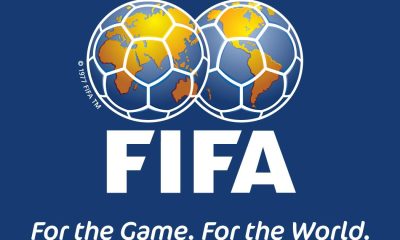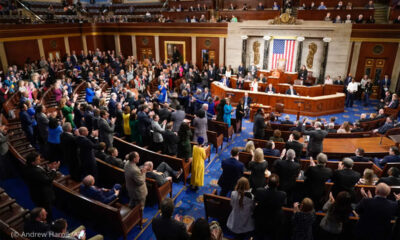News
Nigeria Loses Compensation Bid over Glencore Bribery

Nigeria’s bid to claim compensation from a British subsidiary of mining and trading group Glencore over bribes paid to officials at Nigeria’s state oil company has been denied by a London court.
Lawyers representing the country told London’s Southwark Crown Court that Nigerian officials should be permitted to address the court on November 2 and 3, when Glencore Energy is to be sentenced having pleaded guilty to seven counts of bribery in connection with oil operations in five African countries including Nigeria.
But Judge Peter Fraser ruled that Nigeria does not have the right to be heard, as only the prosecution, in this case the UK Serious Fraud Office (SFO), and the defence can make arguments at a sentencing hearing, Reuters reported.
Nigeria said in written arguments it is “an identifiable victim of Glencore’s admitted criminal activity”, as two of the charges to which Glencore Energy has pleaded guilty relate to payments made to Nigerian National Petroleum Company (NNPC) officials.
The SFO had argued that individuals or entities who are not involved in a criminal case do not have the right to address the court at sentencing, “even if they consider themselves to be the victims of crime”.
Alexandra Healy, representing the SFO, also said in court filings that “there is no link between the bribes paid and any loss suffered”.
Nigeria’s lawyers said Glencore is not prepared to engage on the issue of compensation, but Clare Montgomery, representing Glencore Energy, told the court that her client rejected the “attack on the corporate morals of Glencore”.
READ ALSO:
- N4.6bn Was Used to Fund Jonathan’s Election – Witness
- Terror Alert: Security Agencies Arrest 35 ISWAP Fighters In Abuja
- Bandits Seize Phones Of Police Officers on duty In Zamfara
She also said the contention that Glencore is “hiding behind the SFO to avoid paying anything to [Nigeria] is simply untrue”.
Sam Tate, a partner at law firm RPC which represented Nigeria, told reporters after the hearing that the ruling demonstrated the “very urgent need to reform the rules on compensating foreign countries where we have foreign bribery offences”.
Pressure group Spotlight on Corruption said the court’s decision is “a powerful illustration of why the current compensation framework simply isn’t fit for purpose”.
Glencore International and Glencore Ltd., both part of a Switzerland-based multi-national commodity trading and mining firm, were earlier named in massive bribery of officials of Nigeria’s state-owned oil company, pleaded guilty and agreed to pay over $1.1 billion fine over their involvement in a corruption scheme.
A former United Kingdom-based trader for Glencore Plc, Anthony Stimler,had confessed to bribing officials in Nigeria in exchange for favourable contracts from the NNPC.
Mr Stimler, acting through subsidiaries of Glencore, conspired with others to make millions of U.S. dollars in corrupt bribe payments to officials in Nigeria. The former trader pleaded guilty over what prosecutors in the United States described as his role in a scheme to bribe and he admitted to conspiring to violate the Foreign Corrupt Practices Act and commit money laundering at a hearing in Manhattan federal court conducted by video.
Prosecutors said millions of dollars in bribes were paid to officials in Nigeria, in exchange for NNPC awarding oil contracts and providing “more lucrative grades of oil on more favourable delivery terms.
The US’ Department of Justice said that Glencore had agreed to a criminal fine of more than $428 million and to criminal forfeiture and disgorgement of more than $272 million. Glencore had also agreed to retain an independent compliance monitor for three years.
Between 2007 and 2018, Glencore and its subsidiaries caused approximately $79.6 million in payments to be made to intermediary companies in order to secure improper advantages to obtain and retain business with state-owned and state-controlled entities in the West African countries of Nigeria, Cameroon, Ivory Coast, and Equatorial Guinea.
“Glencore and its subsidiaries engaged two intermediaries to pursue business opportunities and other improper business advantages, including the award of crude oil contracts, while knowing that the intermediaries would make bribe payments to Nigerian government officials to obtain such business.
“In Nigeria alone, Glencore and its subsidiaries paid more than $52 million to the intermediaries, intending that those funds be used, at least in part, to pay bribes to Nigerian officials,” the DOJ stated. The Nigerian government had thereafter asked for compensation.
Thisday
News
NNPC CEO Ojulari Receives Prestigious Energy Institute Fellowship in London
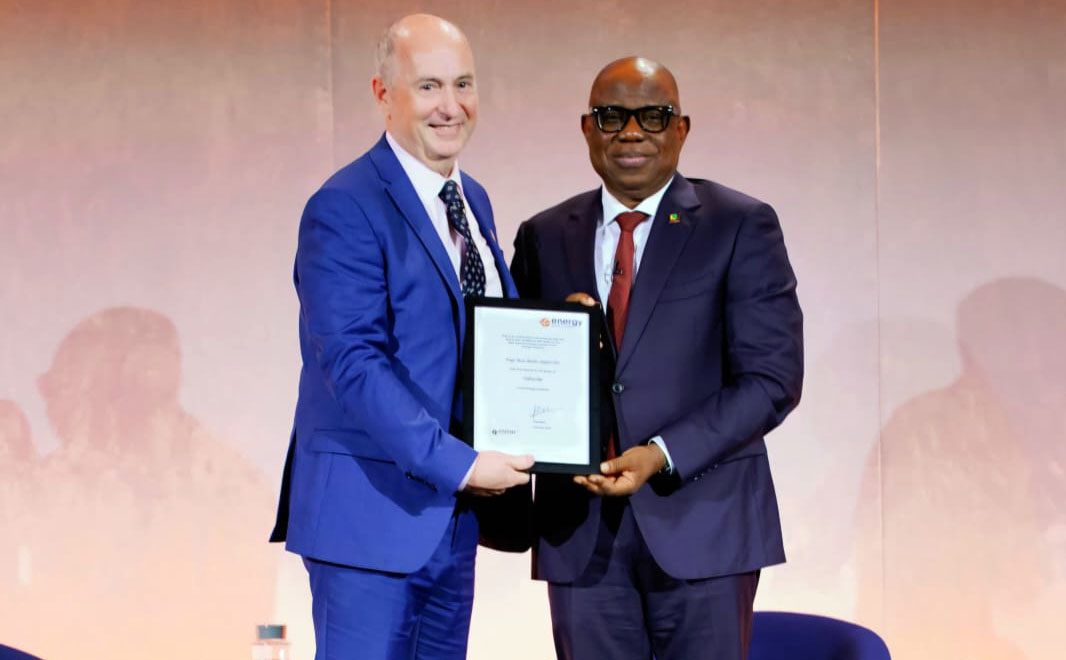
NNPC CEO Ojulari Receives Prestigious Energy Institute Fellowship in London
The Nigerian National Petroleum Company Limited (NNPC Ltd.) has earned international acclaim as its Group Chief Executive Officer, Engr. Bashir Bayo Ojulari, has been conferred with the Fellowship of the Energy Institute (FEI), United Kingdom — one of the highest honours in the global energy industry.
The Fellowship recognises senior energy leaders who have demonstrated sustained, high-impact contributions to the advancement of the energy sector. It was formally conferred on Ojulari during International Energy Week (IEW) in London, a leading platform for energy policy, finance, and industry leadership. (punchng.com)
The honour was presented by Andy Brown, President of the Energy Institute, who praised Ojulari’s transformative leadership of NNPC Ltd., highlighting his role in strengthening governance, embedding a performance-driven culture, and repositioning the company for long-term value creation.
Under his stewardship, NNPC Ltd. has implemented investor-focused reforms, enhanced operational excellence, and expanded strategic global partnerships, all contributing to increased confidence in Nigeria’s energy sector. The recognition reinforces NNPC’s ongoing transformation into a commercially driven, globally competitive, and transparent energy company.
READ ALSO:
- FCT Polls: CSO Situation Room Flags Late Voting, Vote Buying, Logistical Challenges
- ADC Defeats APC to Win First Polling Unit in FCT Area Council Election
- Trump Moves to Indefinitely Suspend Work Permits for Asylum Seekers
Significance for Nigeria and Africa
Experts note that the FEI Fellowship is not only a personal achievement for Ojulari but also a major institutional endorsement of NNPC Ltd.’s reform agenda. Being recognised at International Energy Week, which convenes policymakers, financiers, regulators, and industry leaders, positions the company at the centre of critical global energy discussions on sustainability, energy transition, and capital formation.
The award also signals growing international confidence in NNPC Ltd. and highlights Nigeria’s strategic role in Africa’s energy security and global energy transition ambitions. (vanguardngr.com)
Ojulari’s Leadership Achievements
Since assuming office, Engr. Ojulari has overseen multiple strategic reforms at NNPC Ltd., including:
- Driving governance and operational reforms to boost accountability.
- Expanding strategic partnerships and investor-focused initiatives.
- Enhancing execution efficiency across the company’s subsidiaries.
- Positioning NNPC Ltd. as a credible, investment-ready energy enterprise.
These efforts have not only improved the company’s profitability and performance but also strengthened Nigeria’s energy security and market competitiveness. (punchng.com)
Ojulari described the Fellowship as a reflection of collective effort within NNPC and reiterated his commitment to sustainable value creation, global best practices, and energy sector innovation.
NNPC CEO Ojulari Receives Prestigious Energy Institute Fellowship in London
News
FCT Polls: CSO Situation Room Flags Late Voting, Vote Buying, Logistical Challenges
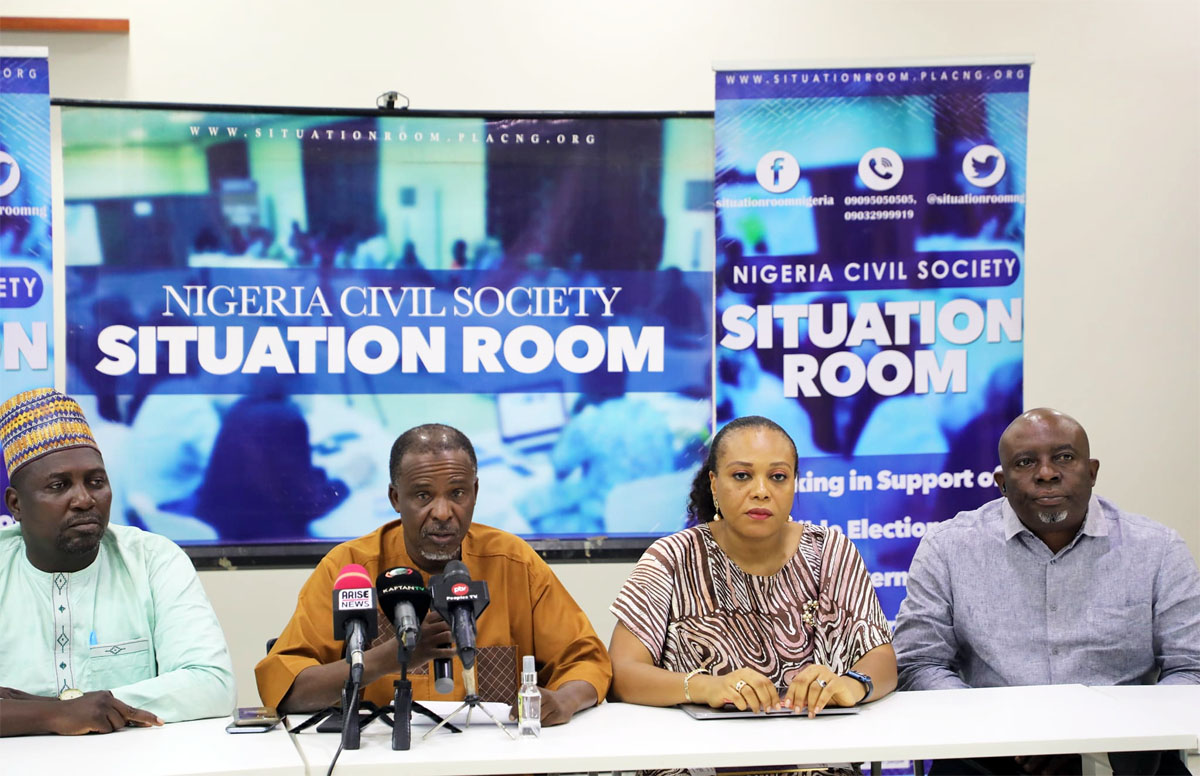
FCT Polls: CSO Situation Room Flags Late Voting, Vote Buying, Logistical Challenges
The Nigeria Civil Society Situation Room has raised concerns over multiple irregularities in the ongoing Federal Capital Territory (FCT) Area Council Elections, citing late polling unit openings, reports of vote buying, and logistical challenges that could affect voter participation.
According to the Situation Room, a coalition of over 70 civil society organisations advocating for credible elections in Nigeria, many polling units opened late, with an average start time of 9:15 a.m., well after the official 8:30 a.m. schedule. Observers also noted low voter turnout in several areas, particularly in AMAC, although queues began forming later in Kuje, Kwali, Gwagwalada, and Abaji Area Councils.
Vote Buying Observed
The coalition reported instances of vote buying, with voters allegedly offered up to ₦10,000 in exchange for ballots in units such as PU008, PU056, PU057, and PU058 in Gidan Mangoro Ward, AMAC. While some of the transactions were open, others were conducted discreetly.
The Situation Room warned that such electoral malpractice undermines the integrity of the election and called on electoral officials, political parties, and security agencies to intervene and prevent further incidents.
READ ALSO:
- ADC Defeats APC to Win First Polling Unit in FCT Area Council Election
- Trump Moves to Indefinitely Suspend Work Permits for Asylum Seekers
- Peller Escapes Generator Fire at Lagos Home, Recalls Earlier Lekki–Epe Scare
Logistical and Accessibility Issues
Observers noted that some voters struggled to locate their polling units after last-minute changes communicated by INEC via text messages. The Bimodal Voter Accreditation System (BVAS) generally performed efficiently, with a one-minute average accreditation time, though malfunctions were reported in a few units including Gwako Town Primary Schools II & IV and PU143, Gwagwalada.
The Situation Room also highlighted accessibility challenges for voters with disabilities, noting that braille ballot guides, magnifying glasses, and other assistive materials were largely absent, even in designated disability communities such as Karimajiji and PU052, Wuse.
Security and Election Conduct
Security personnel, including officers from the Nigeria Police, Civil Defence, Immigration Service, and Fire Service, were present in significant numbers and generally maintained order and professionalism.
Isolated incidents of intimidation and harassment were reported in locations such as Grade 1 Area Court, Rubochi (Kuje); Naharati Sabo School II, Rimba/Ebagi; and PU3, UNG Liman/UNGWAR LIMAN 1, Abaji Central, but security agents swiftly resolved these situations.
Call for Calm and Integrity
The Situation Room commended the INEC FCT Help Desk for promptly addressing reported issues and called on all stakeholders to maintain calm, resist vote buying, and ensure that the will of the people is respected as the polls continue and results are collated.
The report was jointly signed by Mma Odi and Celestine Odo, co-conveners of the coalition.
FCT Polls: CSO Situation Room Flags Late Voting, Vote Buying, Logistical Challenges
News
Trump Moves to Indefinitely Suspend Work Permits for Asylum Seekers

Trump Moves to Indefinitely Suspend Work Permits for Asylum Seekers
United States President, Donald Trump, has introduced a sweeping immigration proposal that could halt the issuance and renewal of work permits for asylum seekers for many years, marking what analysts describe as one of the most consequential shifts in U.S. asylum employment policy in decades.
The proposed rule, released on Friday by the U.S. Department of Homeland Security (DHS), seeks to suspend new employment authorisation for asylum applicants until the average processing time for designated asylum cases falls to 180 days or fewer.
According to DHS data, the asylum case backlog now exceeds 1.4 million applications, with the department projecting that meeting the 180-day benchmark could take between 14 and 173 years under current conditions—effectively creating an indefinite suspension of asylum work permits.
Despite the bleak projections, DHS said administrative restructuring, staffing increases, and efficiency-focused reforms could eventually reduce processing delays. However, officials acknowledged that significant improvements would take time.
READ ALSO:
- Peller Escapes Generator Fire at Lagos Home, Recalls Earlier Lekki–Epe Scare
- Abuja Church Expels Newly Married Woman Over Refusal to Consummate Marriage
- Pastor Sentenced to Death by Hanging for Murdering Landlord in Akwa Ibom
In a statement accompanying the proposal, DHS said the rule, if finalised, “would reduce incentives for frivolous, fraudulent, or otherwise meritless asylum claims.” The department stressed that work authorisation is not an entitlement, but a discretionary benefit granted by the DHS secretary.
If implemented, the policy would generally bar migrants who entered the United States unlawfully from receiving new work permits or renewing existing ones while their asylum claims remain pending.
Limited exemptions would apply only to individuals who alerted U.S. border officials within 48 hours of arrival that they feared persecution, torture, or faced another urgent humanitarian threat.
The proposal forms part of a broader immigration clampdown under President Trump, who returned to office in 2025 after campaigning on stricter border enforcement and tougher asylum standards.
Throughout his campaign and early months back in office, Trump portrayed immigrants and asylum seekers as economic and security burdens, claims that critics argue are not supported by crime or labour market data.
Immigrant advocacy groups, civil rights organisations, and some Democratic lawmakers have criticised the proposal, warning that denying work permits could push asylum seekers into poverty, increase dependence on charities, and drive people into undocumented employment.
Legal experts also expect significant court challenges, arguing that the rule could weaken long-standing U.S. and international asylum protections and undermine due-process guarantees.
The proposal will undergo a 60-day public comment period once it is formally published in the Federal Register on Monday. The regulatory process could extend for months or even years, with the final outcome uncertain amid anticipated legal battles.
Until then, existing regulations governing asylum seeker work permits in the United States remain in force.
Trump Moves to Indefinitely Suspend Work Permits for Asylum Seekers
-

 Politics1 day ago
Politics1 day agoPeter Obi Launches ‘Village Boys Movement’ to Rival Tinubu’s City Boys Ahead of 2027
-

 International2 days ago
International2 days agoCanada Opens New Express Entry Draw for Nigerian Workers, Others
-

 News1 day ago
News1 day agoPolice to Arrest TikToker Mirabel After She Recants False Rape Claim
-

 International1 day ago
International1 day agoEpstein, Ex-Israeli PM Named in Alleged Profiteering From Boko Haram Crisis
-

 metro2 days ago
metro2 days agoOsun Awards 55.6km Iwo–Osogbo–Ibadan Road Project to Three Contractors
-
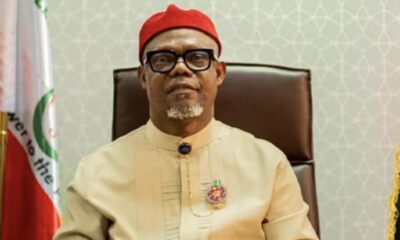
 Politics2 days ago
Politics2 days agoUpdated: Rivers Senator Mpigi Barinada dies at 64
-

 metro2 days ago
metro2 days agoOndo Monarch Killed as Bandits Strike Akure North
-

 Sports2 days ago
Sports2 days agoAdemola Lookman Scores Historic Goal as Atletico Madrid Draw 3–3 With Club Brugge











